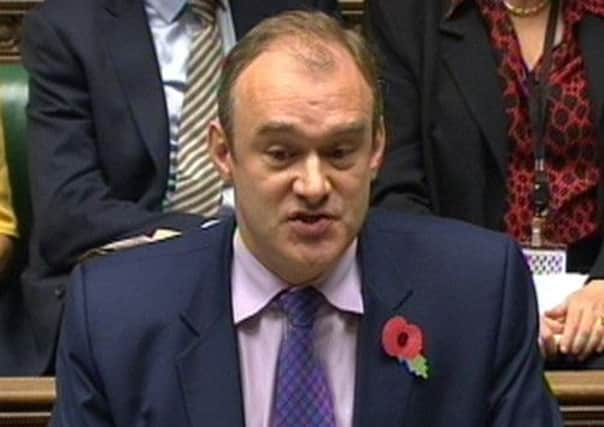Leaders: Lower energy bills should be bottom line


Energy and climate change secretary Ed Davey’s intention to make it a lot easier for consumers to switch their energy supplier – to be able to do it within a day instead of the present five weeks – certainly sounds like a positive move.
But it may be more that consumer inertia, caused by the belief that tedious paperwork and some cost may be involved, rather than the time taken to complete a move, is the real issue. If so, then the additional competition which should drive down prices and Mr Davey presumably hopes for may not occur.
Advertisement
Hide AdAdvertisement
Hide AdMore relevant may be his intention to make the probing of the accounts of the “Big Six” energy supply firms a lot easier. They have been accused of using networks of subsidiary companies to buy and sell fuel and services, eff-ectively from and to themselves, at inflated prices, thereby boosting profits while claiming that they are faced by soaring costs.
More transparent accounting practices should put a stop to that, though the cautionary note, based on recent experience of other big corporates’ activities, has to be that however clever legislators and taxmen think they are, big company lawyers and accountants always seem to be a step ahead of them.
This may be why Mr Davey also wants to increase the size and weight of the stick he can wave at energy companies by making their executives liable to face criminal prosecution if the evidence is that they have been engaged in unfair price-fixing and bill-inflating practices.
Most of the action that can be taken against companies to punish such activities is currently undertaken by regulators. There is good reason for that. Regulators have a sophisticated understanding of the very complex things that companies do and because of that, the fines that Ofgem and other public guardians impose are rarely challenged.
But putting that material in front of a lay jury and expecting them to understand it and follow it through a trial which may last for months might be a sanction too far. Complex fraud trials are few and far between because of that problem. On the other hand, if executives know that some underhand practice might lead to such a trial in a baleful public spotlight and a spell in prison, it could also be a powerful deterrent.
It is to be hoped that Mr Davey had that in mind rather than simply making a political play in a game where politicians are out-bidding each other in seeking to be the public hero tough guy. Action which brings results in the form of lower bills for consumers rather than instant popularity and votes should be the guiding principle.
Bitter reality of a sweet idea
Taxes are not just used by governments to raise money, but also as a means of changing people’s behaviour – encouraging them to stop smoking or to drink less alcohol, for example. Could this work to curb the consumption of sugary drinks?
Researchers at the universities of Oxford and Reading think so. They reckon that a 20 per cent tax on sugar-sweetened drinks would cut their consumption, thereby reducing the number of people who are overweight.
Advertisement
Hide AdAdvertisement
Hide AdThis in turn could significantly reduce the number of people at risk of becoming diabetic and from suffering heart disease and tooth decay.
Given that there have been calls from medical interests such as the Academy of Medical Royal Colleges, this seems to add weight to the idea that the government should test it out.
And as the researchers estimate it would raise £275 million in tax revenues, it sounds like a winner in these fiscally stretched times.
Neither does it sound all that far-fetched. If you imagine the average shop shelf stocked with one sugared drink costing £1.20 and next to another near-identical but artificially-sweetened, or “diet” version, at £1 then the effect on average shoppers’ preferences could be very real.
The difficulties would come with practical implementation. Is there an acceptable level of sugar content?
Chemistry can complicate things further. Does corn syrup, the basis of most cola drinks, qualify as sugar? Should tagatose, actually a sugar but which contains only about two-fifths of the calories of regular sugar, be taxed similarly?
It looks like a good idea in theory, but probably unworkable in practice.